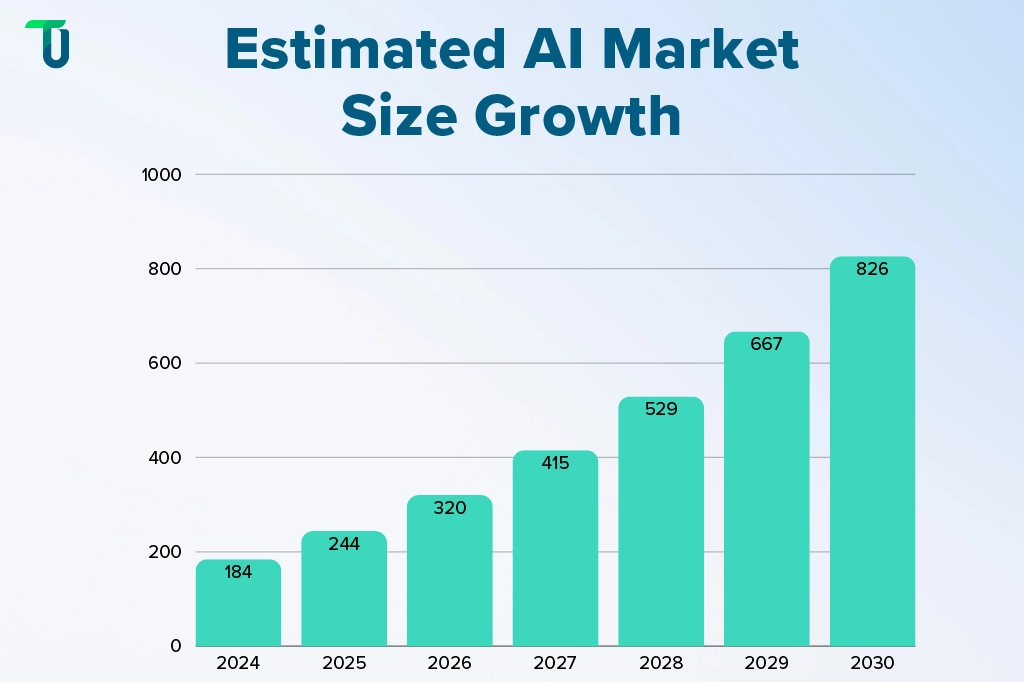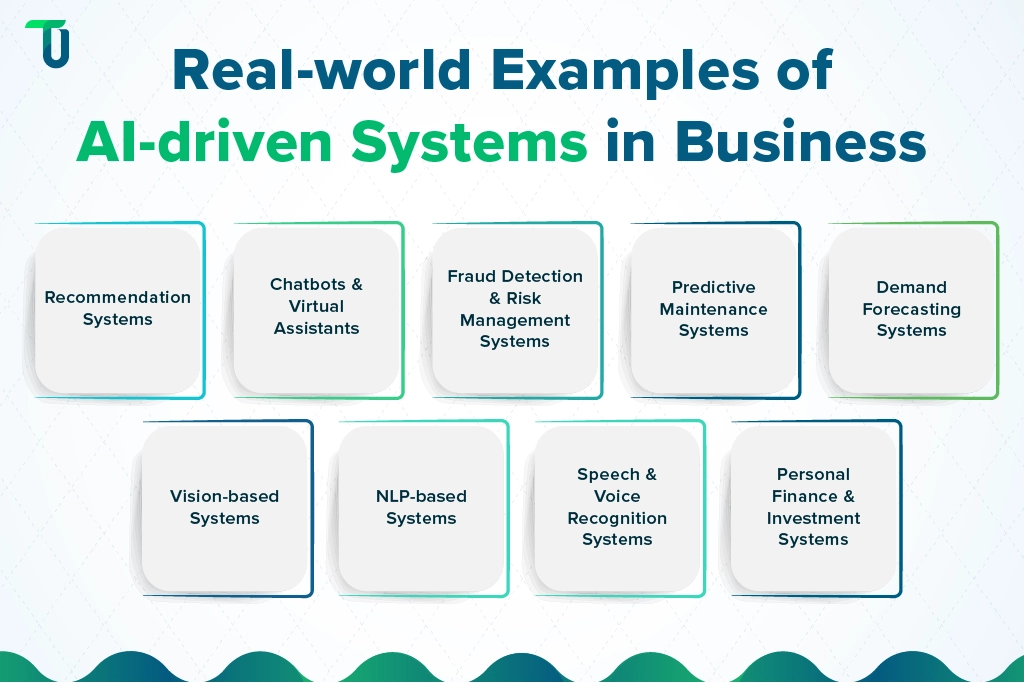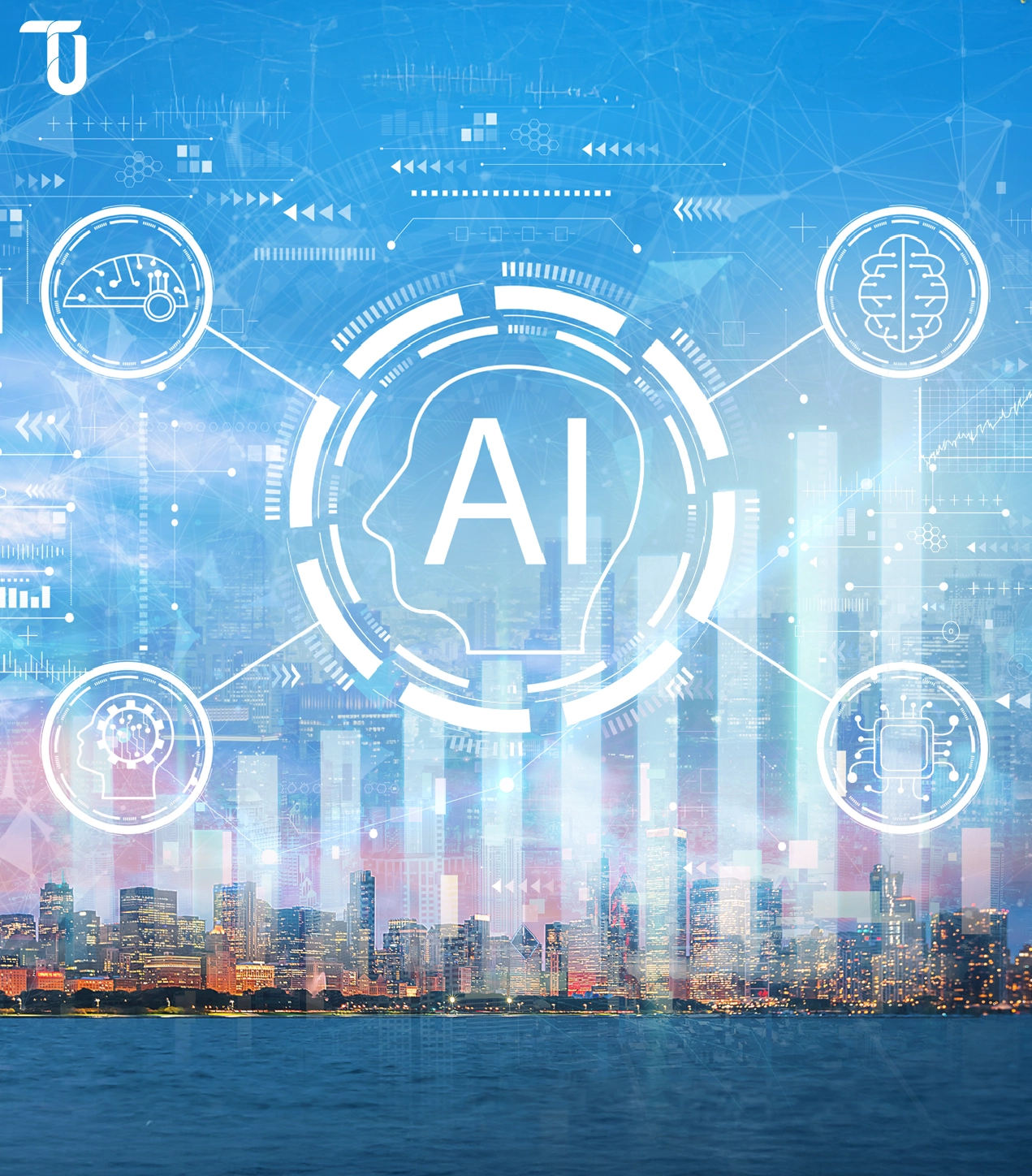How Artificial Intelligence is Transforming Business Operations: Insights from Research
Did you know that the Global Artificial Intelligence Market reached USD 184 billion in 2024? It is a result of an increasing adoption of digital technologies and greater awareness of AI’s capabilities in automation and streamlining business processes. This market is expected to reach USD 826.70 billion by 2030 by growing at an enormous rate of 28.45% during this period, according to Statista research.

Another research report by Markets and Markets suggests that the software segment is majorly influencing the AI market’s growth worldwide with Discriminative AI (predictions and classifications) and Generative AI (new content generation and other NLP-based tasks). These comprehensive AI capabilities have led to many real-world use cases across industries. Business functions like Marketing & Sales, Human Resources, Finance & Accounting, Operations, and Cybersecurity are rapidly adopting AI solutions.
The early adopters are reaping benefits like improved productivity, efficiency, and cost savings. Innovative products and personalized services are rapidly changing consumer preferences for convenience and speed, thus fundamentally altering how businesses run to stay competitive.
Need Help with AI Adoption for Your Business Operations?
We will analyze your business needs and recommend areas where AI integration will provide tangible benefits.
Real-World AI Applications: Transforming Business Operations with Use Cases
Let’s explore the most commonly used AI-driven systems and how they are utilized by different business functions across industries:

AI-driven Recommendation Systems: These systems combine data with machine learning techniques and sometimes predictive analytics to provide personalized recommendations. You must have noticed how YouTube suggests videos similar to the ones you usually prefer and Amazon recommends products similar to the ones you searched for earlier, that’s a recommendation system in action. Use cases include:
- Analyzing consumer behavior and recommending products to improve discovery for customers, and encourage additional sales for E-commerce platforms.
- Creating a tailored viewing experience by providing personalized content recommendations by analyzing user preferences and viewing patterns for media and entertainment platforms.
- Allowing dynamic pricing models in the travel and hotel industry by analyzing demand, seasonality, competition, etc., and enhancing pricing strategies for increased profitability.
- Offering personalized learning paths, improving student engagement, and encouraging course completion tailored to students’ interests and skills.
- Creating targeted marketing campaigns to increase conversion rates by analyzing consumer data and audience segmentation using predictive analytics.
- Enhancing IT operations (AIOps) via automation, optimization, and recommending the course of action to IT professionals.
AI-based Chatbots and Virtual Assistants : Commonly utilized to enhance customer experience, they provide business benefits like scalability, consistency, 24/7 availability, and more. Virtual Assistants used in the Banking and Finance sector are highly popular. For example, Bank of America’s Erica provides guidance to customers and automates common queries. Here are some more use cases:
- Generating leads by engaging customers, learning about their needs, and collecting contact information.
- Monitoring social media and providing personalized responses to customers' comments or queries.
- Assisting event managers by automating responses to queries concerning ticket prices, schedules, locations, etc.
- Collecting patient data, scheduling appointments, and even giving preliminary advice in healthcare institutions.
- Providing real-time assistance to customer support employees and freeing them from repetitive work to handle more complex tasks.
- Reducing cart abandonment rates, tracking orders, and helping customers find products on e-commerce sites.
AI-powered Fraud Detection and Risk Management Systems : As all industries face fraud and risks in some form, these systems find many applications. For instance, PayPal assesses risks in transactions in real-time by utilizing fraud detection algorithms. Other use cases include:
- Detecting and preventing phishing-based frauds by identifying warning signs of phishing links like an absent HTTPS token, domain registration, site age, etc.
- Preventing identity theft by flagging anomalies from expected patterns and alerting the security team.
- Mitigating risks associated with debit and credit cards by preventing fraudsters from accessing important information.
- Preventing payroll frauds within enterprises and small businesses by detecting sudden changes in account numbers or pay recipients.
- Preventing frauds conducted by forging government-issued identification like state IDs, driver’s licenses, or other official documents.
- Monitoring transactions to prevent money laundering and terrorism financing by reporting suspicious activities.
AI-driven Predictive Maintenance Systems : Combining Machine Learning and IoT, these AI-powered systems help many industries manage their equipment and assets. These systems predict potential failures and optimize maintenance schedules to help businesses lower downtime, improve safety, enhance productivity, and reduce maintenance costs. For example, General Electric (GE) uses the AI-driven predictive maintenance platform Predix in the Aviation industry. Here are use cases in other industries:
- Manufacturing companies like Siemens use predictive maintenance for their machinery and equipment, like production lines, industrial robots, etc.
- Companies in the Aerospace and Aviation sectors, like Rolls-Royce and Delta Air Lines, use predictive maintenance for engines and other critical components.
- In the energy and utility industry, especially for mining and oil & gas operations, these systems help prevent equipment breakdown in harsh, remote conditions.
- Minimizing disruptions in patient care, predictive maintenance systems help healthcare organizations keep their medical equipment up and running.
- The transportation and logistics industry uses predictive maintenance systems to monitor vehicles, improve fleet management, and enhance safety.
- Predictive maintenance helps water and wastewater treatment plants prevent environmental contamination by avoiding unplanned equipment failures.
AI-based Demand Forecasting Systems : These systems are utilized heavily in supply chain management across industries. They help businesses plan better, mitigate risks, and reduce costs. They use predictive analytics and historical data to predict demand and align supply. For instance, Walmart uses an AI-powered inventory system that anticipates demand based on past data and future predictions. Other use cases include:
- Helping companies handling international logistics anticipate cross-border demand and optimize shipping routes and customs clearance processes.
- Aiding the travel and hospitality industry to reduce costs, and optimize booking management and resources, especially during favorable business seasons.
- By predicting treatment demands, the healthcare sector can ensure the availability of medicines, beds, staff, and equipment.
- Banking and financial institutions predict service demands to align their offerings, optimize resource allocation, and improve marketing strategies.
- Manufacturing companies forecast seasonal demand and tackle market changes while optimizing raw materials sourcing and production schedules.
- The retail and e-commerce sectors use demand forecasting systems to avoid stockouts, reduce waste, anticipate sales returns, and manage inventory.
AI-Powered Vision Systems : Enabling machines to decipher visual data like images and videos, these systems help identify objects, detect patterns, etc., ensuring multiple applications across industries. Amazon Go uses a combination of Vision AI, Deep Learning, and Sensor Fusion algorithms to detect products picked by customers and facilitate a cashless, cashierless shopping experience. Here are some more interesting use cases:
- The healthcare sector uses medical imaging systems that utilize Vision AI capabilities to analyze X-rays, CT scans, MRIs, etc.
- Surveillance Systems and Traffic Monitoring Systems use facial recognition and object detection to track individuals and vehicles, respectively.
- Autonomous or self-driving vehicles use visual data from cameras and sensors to detect obstacles and navigate seamlessly.
- The retail industry uses AI-powered cameras and systems to track customer behavior, reduce theft, and manage inventory.
- Logistics companies use Vision AI to scan products for defects and allow staff to use automated systems for increased efficiency and accuracy.
- Vision AI-based solutions help the sports industry track player and ball movements in real-time, analyze team and individual performances, assist referees, and deliver live insights.
AI-based NLP Systems: Depending on how they are built and utilized, these NLP-based systems cover a wide range of use cases across industries from generating content to analyzing data and delivering insights. A popular real-world example is Twitter using NLP algorithms for content moderation and abuse detection, language translation, and trend detection. Other use cases include:
- Gen-AI and NLP-based systems are used in multiple industries to automate document processing; be it for legal, healthcare, recruitment, or finance.
- NLP powers Sentiment Analysis Systems for Social Media monitoring, analyzing customer/employee behavior, and identifying trends.
- Extracting both structured and unstructured data from multiple sources and arranging it meaningfully to create summaries and reports. For example, parsing resumes for faster hiring decisions.
- Content generation, like subtitles for Netflix, or product descriptions for eBay, and translating content in multiple languages.
- Billing and auditing process automation across industries, analyzing communication via emails and other text messages, and adapting material for personalized learning in the education sector.
- AI-based systems facilitate faster medical research by reviewing the vast medical literature and identifying the required documents.
AI-driven Speech and Voice Recognition Systems: Speech recognition includes understanding and processing spoken language whereas voice recognition involves identifying the speaker. So, these systems can understand words and sentences, recognize the individual speaker, and convert speech to text. The most common examples include virtual assistants like Alexa and Siri. Here are some business use cases:
- E-commerce giants like Amazon and Walmart allow shopping and customer support via voice commands.
- The education sector provides transcripts of lectures to students with hearing impairments. AI-based systems help students interact with educational content. Language apps use voice recognition to improve learners’ pronunciation.
- Multiple industries are making products smarter by integrating voice recognition capabilities. Example: Smart thermostats.
- Voice biometrics to authenticate users and help businesses enhance security.
- Integrating voice recognition in IVR systems to automate query understanding and divert calls. Sentiment analysis in customer calls gives better control to businesses in handling emergencies.
- Medical transcriptions of patient-doctor conversations to document patient histories in EHRs (Electronic Health Records). Automated analysis of biomarkers from patient’s speech to diagnose certain medical conditions.
AI-powered Personal Finance and Investment Systems: They help both financial institutions and individuals manage their finances, reduce risks, and make data-driven decisions. For example, Wealthfront is an automated advisory service that creates customized investment portfolios and helps clients manage and grow their wealth.
- Personal finance apps track your spending habits, set up and monitor your budget, and recommend savings based on your income and goals.
- They integrate with banks, mutual funds, and other institutions offering savings and investment products to facilitate easy investments.
- Investment advisory firms offer AI-based apps, also called robo-advisors, which provide personalized advisory and investment management services after analyzing your risk tolerance, financial goals, and time frame.
- Algorithmic trading is gaining prominence with hedge funds and other trading firms using AI-based systems to predict market trends and trade optimally.
- Credit scoring firms utilize AI to analyze financial history and gauge creditworthiness on various parameters.
- Asset managers use AI-based systems for dynamic asset allocation and adjusting portfolios based on risk and return, market data, and other relevant factors.
Optimizing Business Operations with Tailored AI Solutions for Efficiency and Growth
The importance of AI in transforming how businesses operate can’t be emphasized more. We’ve already discussed how AI impacts businesses in every industry and business function with real-world examples, use cases, and statistics. Businesses adopting technological advancements drive innovations and create a competitive advantage. So, if you want to get ahead of the curve and solve your pressing operational problems using AI-based systems, we can help!
We specialize in building custom AI solutions tailored to your business needs and fine-tuned to provide accurate outcomes for your niche tasks. Please explore our comprehensive AI Engineering Services.
Here are some of our success stories, where we have developed result-oriented solutions. Read the entire case studies to understand how our custom-built solutions benefitted our clients:
- Check out an AI-driven solution we built for a fishing industry client that has become a go-to app for fishing enthusiasts.
- Read about our AI-powered real-time betting solution that has revolutionized the casino experience and increased casino revenue by 85%.
- Find out how we automated and optimized candidate search in recruitment by developing an AI-based RAG Chatbot.
This is just a glimpse of the varied AI-based solutions we have developed for clients across industries. Our team takes pride in providing personalized recommendations and designing customized solutions after carefully considering our client’s requirements, existing infrastructure, budget, and time frame.
Need AI-based Solutions to Enhance Your Business Operations?
We have the skills and experience to build an AI-based system from scratch or enhance your existing system.

